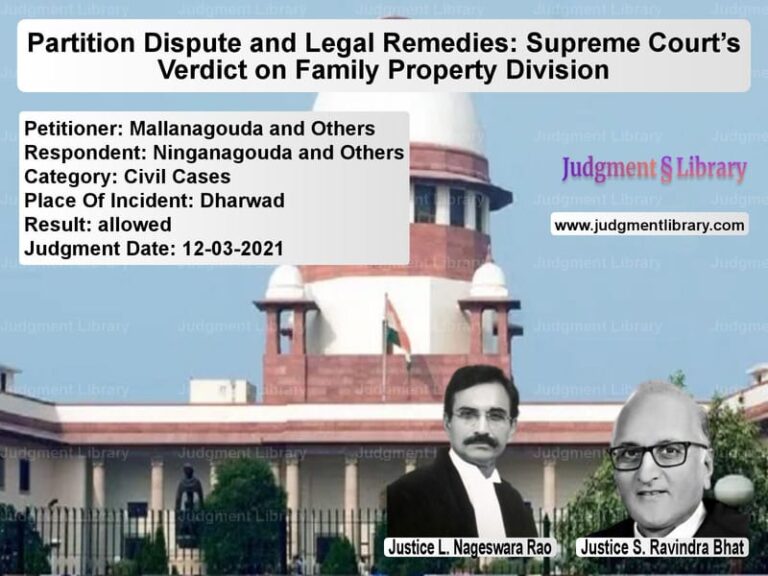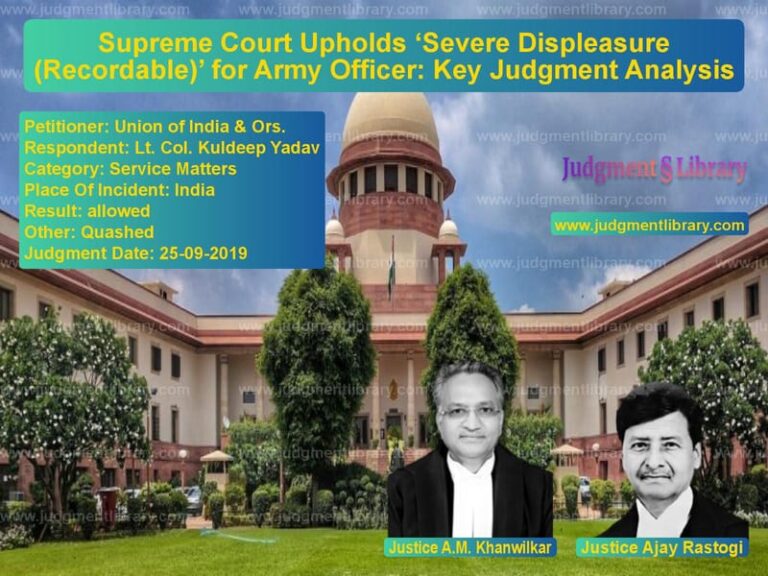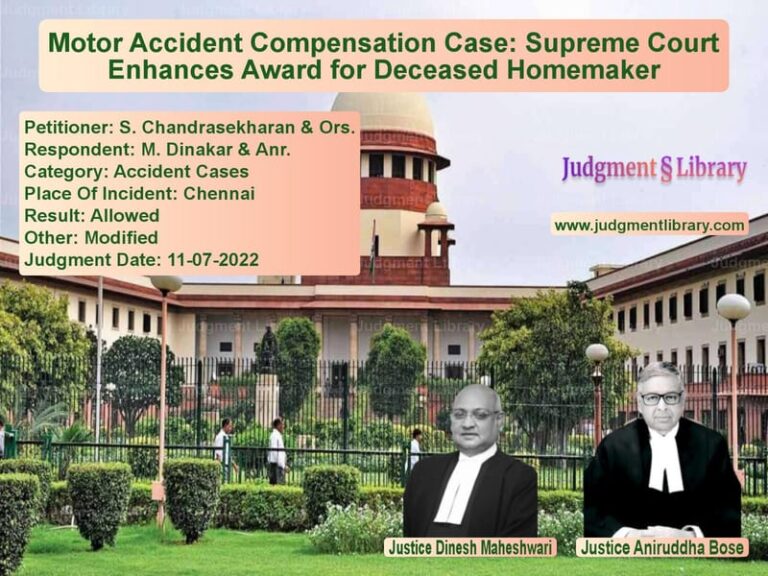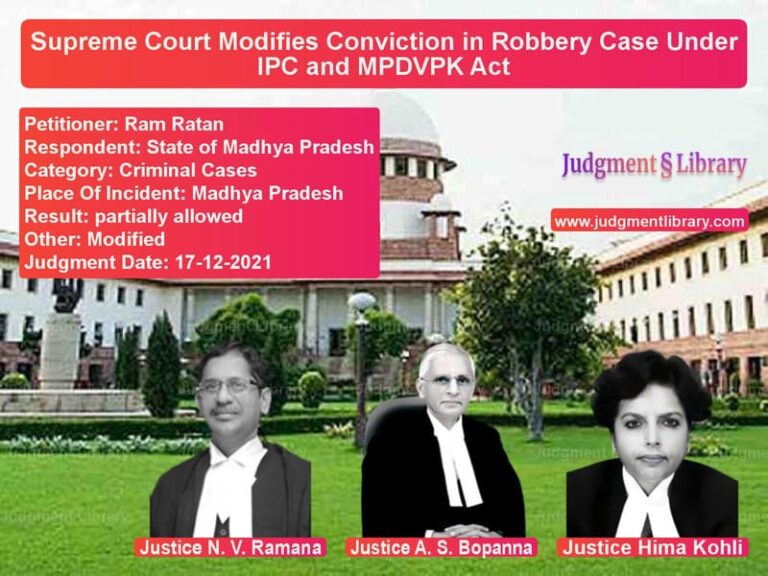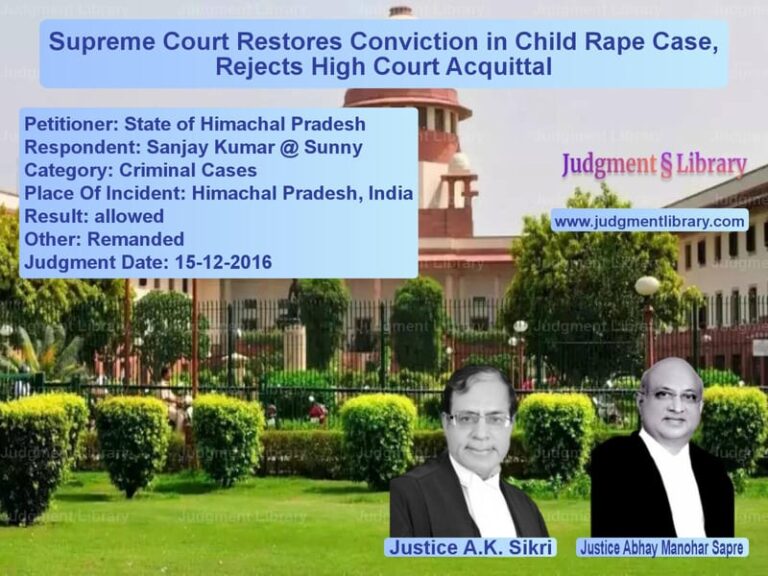Armed Forces Tribunal’s Decision Overturned: Supreme Court Rules on Promotion of Army Officer
The case of Union of India & Others vs. Col Ran Singh Dudee is a significant ruling concerning promotions within the Indian Army and the judicial review of selection board decisions. The Supreme Court had to determine whether the Armed Forces Tribunal was justified in directing the promotion of an army officer despite the Selection Board finding him unfit for promotion.
Background of the Case
Col Ran Singh Dudee, the respondent, was initially enrolled in the Indian Army as a Sowar in 1981. After clearing the UPSC examination in 1988, he was commissioned as an officer in the Ordnance Corps of the Army. During his career, he faced disciplinary actions, including a General Court Martial (GCM) in 2005, which resulted in cashiering and three years of rigorous imprisonment. However, in 2013, the Central Government annulled the GCM proceedings and reinstated him with all consequential benefits.
Despite reinstatement, his request for promotion to Brigadier was denied by the Selection Board. The Armed Forces Tribunal ruled in his favor, but the Union of India challenged this decision in the Supreme Court.
Legal Issues Raised
1. Scope of Judicial Review Over Selection Board Decisions
Should courts interfere in the selection process conducted by the Army’s Selection Board?
2. Interpretation of ‘Consequential Benefits’
Did the government’s decision to annul the GCM proceedings entitle the respondent to automatic promotion?
3. Assessment by the Selection Board
Was the Selection Board justified in not recommending the respondent for promotion?
Arguments by the Parties
Arguments by the Appellant (Union of India)
- The decision of the Selection Board was based on merit and comparative assessment.
- The respondent had disciplinary issues, including a past reprimand in 1991.
- Judicial review should not interfere with military promotions unless there is illegality or mala fide intent.
Arguments by the Respondent (Col Ran Singh Dudee)
- The annulment of GCM proceedings entitled him to all consequential benefits, including promotion.
- The Selection Board’s evaluation was flawed as he had a better overall profile than some empanelled officers.
- His past disciplinary record should not have been considered after his reinstatement.
Supreme Court’s Observations
1. Judicial Review of Selection Board Decisions
The Court reiterated that judicial review is limited in matters of military promotions:
“It is not the function of the court to scrutinize the relative merits of candidates. The decision of the Selection Board can be interfered with only on grounds of illegality or procedural irregularity.”
2. Consequential Benefits Do Not Include Automatic Promotion
The Court held that the annulment of GCM proceedings only restored the respondent’s previous status but did not guarantee promotion:
“The benefits conferred do not extend to automatic empanelment for promotion, as selection is based on comparative assessment.”
3. Justification for the Selection Board’s Decision
The Selection Board assessed officers based on six parameters, including overall profile, course performance, and discipline record. The respondent was found lower in three criteria compared to empanelled officers. The Court ruled:
“The Selection Board is best placed to evaluate merit, and courts should not substitute their views for expert assessments.”
Final Judgment
The Supreme Court allowed the appeal and set aside the Armed Forces Tribunal’s decision. It ruled:
“The Tribunal was wholly unjustified in interfering with the decision of the Selection Board. The appeal is allowed, and the judgment of the Armed Forces Tribunal is set aside.”
Implications of the Judgment
This ruling has significant implications for military promotions and judicial oversight:
- Reinforces Selection Board Authority: Confirms that military promotion decisions should remain within the domain of the armed forces.
- Clarifies ‘Consequential Benefits’: Establishes that reinstatement does not automatically entitle an officer to promotion.
- Limits Judicial Intervention: Restricts courts from interfering in merit-based promotions unless there is proven illegality.
- Maintains Military Discipline: Ensures that past disciplinary records remain a valid consideration for promotions.
Conclusion
The case of Union of India & Others vs. Col Ran Singh Dudee is a landmark ruling that upholds the principle that military promotions should be determined by Selection Boards, not judicial intervention. The Supreme Court’s decision ensures that promotions in the armed forces remain a merit-based process and that disciplinary history can be a valid criterion for selection.
Petitioner Name: Union of India & Others.Respondent Name: Col Ran Singh Dudee.Judgment By: Justice Adarsh Kumar Goel, Justice Uday Umesh Lalit.Place Of Incident: India.Judgment Date: 03-07-2018.
Don’t miss out on the full details! Download the complete judgment in PDF format below and gain valuable insights instantly!
Download Judgment: Union of India & Oth vs Col Ran Singh Dudee Supreme Court of India Judgment Dated 03-07-2018.pdf
Direct Downlaod Judgment: Direct downlaod this Judgment
See all petitions in Employment Disputes
See all petitions in Promotion Cases
See all petitions in Public Sector Employees
See all petitions in Judgment by Adarsh Kumar Goel
See all petitions in Judgment by Uday Umesh Lalit
See all petitions in allowed
See all petitions in supreme court of India judgments July 2018
See all petitions in 2018 judgments
See all posts in Service Matters Category
See all allowed petitions in Service Matters Category
See all Dismissed petitions in Service Matters Category
See all partially allowed petitions in Service Matters Category


